The Wait Begins...
Tackling spring marathons together!

Over the next week, some of you will be peeking out of your letterboxes, eager to discover whether you've got a place in the London Marathon. And even if you're not the sort to be drawn in by the glitz of the big event, your thoughts might well be turning to the idea of a spring marathon. There are plenty of them! So far in 2014 our Event Finder has 264 marathons listed in Britain and Ireland, and 434 across the globe.
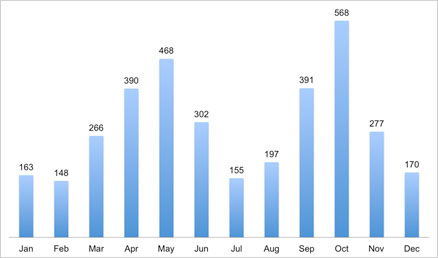 The number of marathons in our Event Finder, by month.
The number of marathons in our Event Finder, by month.In last week's article, I waded into the vast amount of data available in the Fetch database to divine some 10k statistics - grouping thousands of runners according to their finishing time, and examining the sort of training they did in the build up to their races. It's fascinating to see trends emerge, and it can be useful when it comes to planning future training.
However, there are several problems that crop up when analysing a big chunk of data in retrospect - mostly originating from the fact that numbers often tell only part of the story. A five mile run with an average pace of 10mins/mile sounds like it could be a nice consistent trot through the autumn leaves, but those top-level numbers could easily be masking a particularly nasty interval session.
For every runner, there are a plethora of unseen details lurking below the surface that have an impact on race outcome - and unless we can record this type of information in a consistent way, our confidence in predictions and guidelines takes a corresponding hit. So with just over six months to go until spring marathon season, it's a good time to think about how we can capture just a little bit more detail.
Of course, there's no need to reinvent the wheel (although cycling is cheating). You could just follow a training plan, or base your efforts on basic training principles - and do the best that you can. But any valid tactic that helps shape our experience and guides us towards success is surely welcome.
So I'd like to take things a little bit further, and investigate the progress of everyone who is building up to a spring marathon. It could be the biggest experiment of its kind in the known universe. Let's get some firm ideas about our goals and our goal races, and our attitudes to achieving them. Let's do what we can to explain away anomalies that obscure the underlying rules. Let's find a consistent way to record our intervals and effort runs, so that when we look back upon thousands of race performances, we can compare like with like.
Runners! This is your bit!
To begin the process, we obviously need a group of runners. If you're planning to run a marathon any time soon, find it in our Event Finder, and add it to your race portfolio (if we don't have the race listed, you can add it). If you possibly can, add a time prediction - make it your best guess at your goal time. And from here on, make sure you log all your training on Fetch, and keep an eye out for updates.
Everyone else! Here's where you come in!
We also need scientists! Now is the time to make your suggestions about what information we should be recording. What can we ask our runners to help clarify what the numbers are telling us? It's time to put forward your hypotheses about where marathon mojo comes from, and what sort of training contributes to success. A bit of foresight now will make the springtime hindsight just that little bit clearer! Leave your comments below.
For my part, I'll be thinking about what we can do to improve our training log, to help us get a clearer picture - and I'll be writing up the results in regular articles over the next six months. For anyone in doubt, I've no intention of selling this information on, nor using it to mis-sell you Payment Protection Insurance. It'll all be used in an anonymous crowd-based fashion. And I'll be doing my best to join that crowd too - which reminds me, I must go and stand in the hallway. No reason.

Picture: Getty Images / Laurence Dutton
Other Marathons Do Exist!
If you're licking your wounds after defeat in the London Marathon ballot, then help is at hand. Here are the most popular springtime marathons in our race portfolios.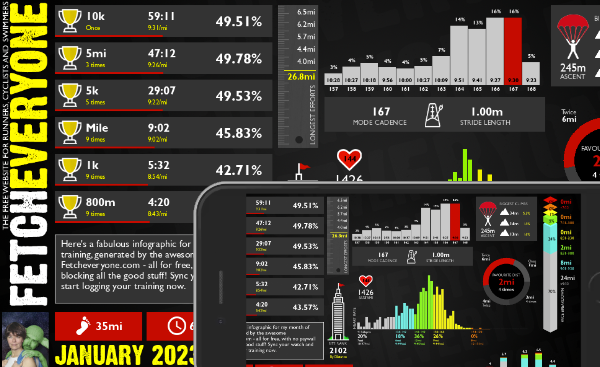
Monthly Summary
A brand new shareable infographic showing a colourful breakdown of your training month.

Marathon Prediction
We delve deeper to give you greater insights when working out your goal marathon time.
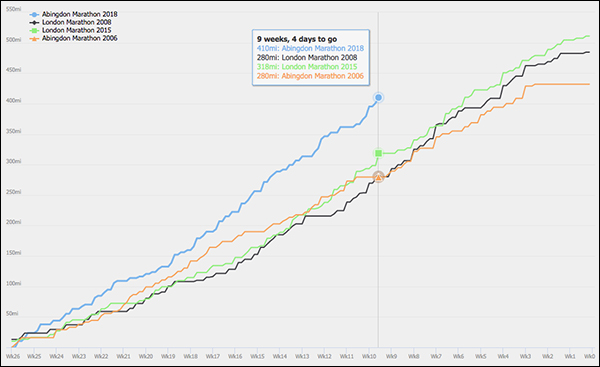
Pre-race Training Analysis
See your accumulated mileage in the weeks leading up to any event in your portfolio, and compare it to your other performances

Your 365 Day Totals
Peaks and troughs in training aren't easy to find. Unless you use this graph. Find out what your peak training volume really is
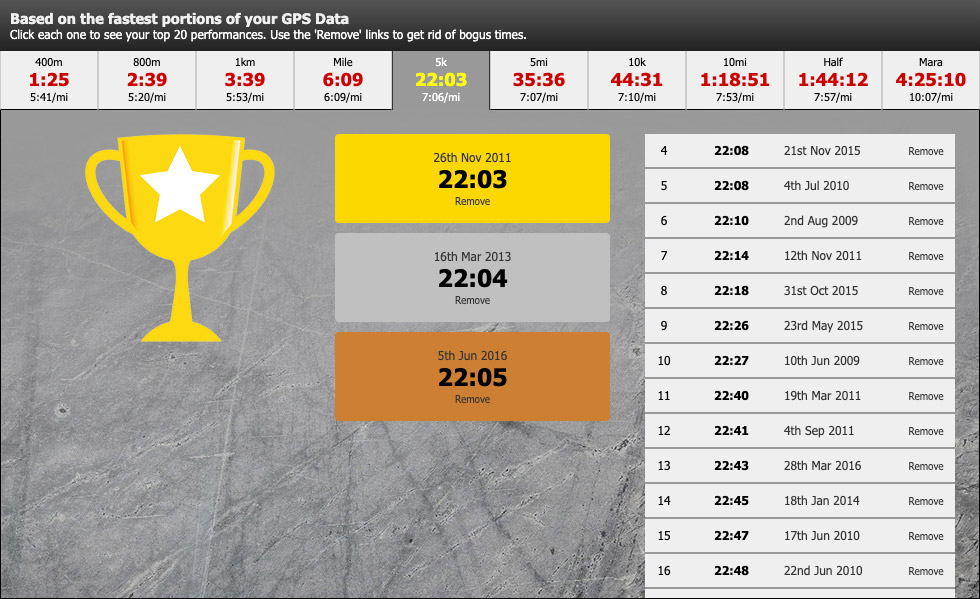
Benchmarks
See the fastest portions from all your training runs. Filter by time to give you recent bests to aim at. Every distance from 400m to marathon.
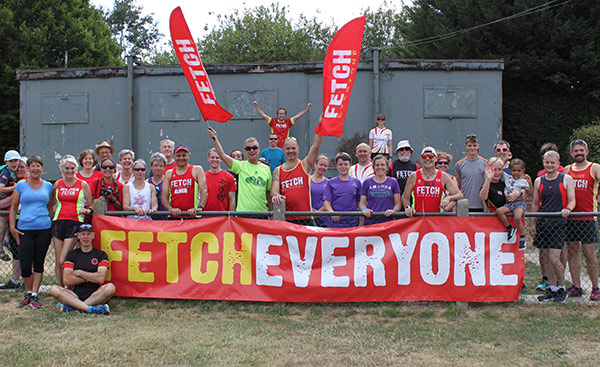
Fetch Everyone Running Club
Join our UKA-affiliated club for event discounts, London Marathon ballot places, the chance to get funded for coaching qualifications, and a warm feeling inside.


Leave a comment...
-
I love this idea - but I am not contemplating a marathon until autumn 2015 so I won't volunteer, but would watch with interest - especially as it will be my first (assuming I take the plunge!)
Autumnleaves
-
Nice idea. Accurate recording of long runs? I tend to put too many runs into the general running bit of training, maybe put general at the bottom so folks have to scroll down for it?
Ultracat
-
I'll have to be a scientist, because my Spring 2015 mara (if there is one) will only be build up to the main event which is 95 miles in June 2015 (WHW). But suggestions for what to record, I have made in Feedback before (it will be on that spike you keep all the suggestions/ideas
 ) - Intervals: auto extract the fast bits and call that 'effort distance and pace', the slow bits and record that as just 'recovery time' and log the number of each. Anything before or after is just warm up and cool down. If the auto extract doesn't find then say 'you have called this intervals, but I can't detect them, please enter manually' or conversely, if the laps/pace look like you were doing intervals and you've logged as 'general' you could prompt for 'looks like you were doing Intervals'. (Which reminds me of that annoying Paperclip in Windows 95 or 97 - remember him?!) Ditto with Tempo and MP. Possibly also reovery (significantly slower than the runner's 'average' run pace) etc. Basically prompt for more/better data.
) - Intervals: auto extract the fast bits and call that 'effort distance and pace', the slow bits and record that as just 'recovery time' and log the number of each. Anything before or after is just warm up and cool down. If the auto extract doesn't find then say 'you have called this intervals, but I can't detect them, please enter manually' or conversely, if the laps/pace look like you were doing intervals and you've logged as 'general' you could prompt for 'looks like you were doing Intervals'. (Which reminds me of that annoying Paperclip in Windows 95 or 97 - remember him?!) Ditto with Tempo and MP. Possibly also reovery (significantly slower than the runner's 'average' run pace) etc. Basically prompt for more/better data.
 G
G
HappyG(rrr)
-
I'm not contemplating another Marathon this century, but my suggestion would be an effort drop down box with say Easy, Steady, Hard to reflect how much you put into the session. Hope you sort it for 2100.
Chrisity
-
HappyG has covered the issues with logging intervals -
Rosehip
-
I like HappyG(rrr)'s idea of categorising races, not all are PB attempts, many are training runs for other events.
 )
)
Fitz
-
I have Liverpool marathon planned for June 2015 (4th one) and intend to follow Hanson Method which peaks out at 16 mile long run, but shed loads of MP stuff on tired legs. Should be interesting as last 3 have been done on tradition 20 mile+ runs.
Neilio
-
How about 'plethora'?

fetcheveryone
-
Kent Roadrunner May 2015 and living in the postbox on my telegraph pole waiting for a VMLM letter. No sensible comment to add , except that I'm old

oldbiddy
-
I think you need to capture the intensity expectation of the training. Is it just to vet round, or is it to break a new record. Is the target optimistic? Maybe rather than one prediction/target you could capture three targets; dream time, target time, acceptable time.
Nightjar
-
Yes I want to be involved please. I'm running London (deferral from car accident related crapness this year), and I have just finished my MSc in Sport & Exercise Psychology and have been through a summer of pain learning stats that were not even on the course, and still have a license for SPSS for a while longer I believe. Do message me!
JuliaD
-
I'm happy to help in any way

-x-x-
-
I'd have to be on the Scientist side this year, and happy to help in any way I can.
stuart little
-
This may be a bit simplistic but how about even having a tick box for marathon training. I trained over 5 months (as I'm a slow coach), but not all my sessions were actually included as marathon training. I am a jog leader too, so I didn't really take into account any of those sessions although they counted towards my eventual miles on feet. Think the stuff HappyG(rrr) has suggested is fab - if I only understood it

Corrah
-
It could be useful to note how many marathons someone has done or whether this is a first marathon. I trained following a strict plan for my first, but the time commitment for doing several marathons in a year is excessive and I don't think I need so many miles for each one. Now I tend to do top up long runs and more targeted hill, tempo and interval sessions.
Groundhog
-
I second HappyG(rrr)s suggestion for intervals. This is a good idea for intervals uploaded automatically. I upload my runs manually and use the intervals section for the actual effort and general for the rest period. Technically I suppose the word interval is a bit strange because Ive heard some people say that the interval describes the rest period, a bit like an interval at a theatre.
milemonster
-
Very good. I reckon you'll need the guinea pigs (may I call them that) to distinguish between easy runs and recovery runs, A long run (must be over a set distance 10 miles perhaps), you may need to separate out long runs aimed at Marathon pace. Agree with the intervals suggestions, warm up and warm down will need to be recorded. Tempo runs are difficult too, you will need a set way of recording that. i.e again separate out warm up and warm down. I would think cross-training comes into this too, you may be able to see what cross-training helps best, cycling I would imagine. Lastly, maybe you need a group so that there is a consistent way of recording stuff, unless you get that consistency, it'll be difficult to work out. I liek that idea of recording how many marathons, perhaps you will see an improvement from experience or consecutive years at attempting maras, liek your 10k article, maybe there are only so many PBs you'll get....
Ocelot Spleens
-
I think the intensity thing is a good idea, also as others have noted - a marathon for some may not be about a pb or even be the main goal of their training. This also depends on the race - the training and outcomes for Trail Marathon Wales would be very different for a flat road marathon, so may skew the results!
Shred Betty
-
+1 on the intervals section. This has been something that has been frustrating about the training section for a while. I'd guess there might be a need to be able to enter the time/distance multiples manually for those who do track intervals with just a wristwatch.
The Teaboy
-
Anyone who records an Interval session - WU, efforts, recoveries, and WD - all as one amorphous overall distance and time obviously doesn't want to help themselves, so they're unlikely to be persuadable to record it differently to help others. Harsh, but (I think you'll find) fair.
paul the builder
-
Maybe capture 'Year started running' as there could be some insight to be gained from comparing new runners' training/performance with that of experienced runners. i.e. runners with an earlier start date logically should have the most cultured training plans, but is this true? (acknowledging the fact that there are variables, such as mileage, that would need to levelled to get a clear picture)
K-Bal
-
Excellent article and also many valuable comments and suggestions. This sounds like a very fascinating experiment and I'm happy to contribute as a guinea pig. I'm already doing some of the suggestions, e.g. logging warm up and warm down of interval sessions separately, distinguishing between Recovery, Easy and General, Medium and Long Runs, etc. but there are also a few things I can implement to make the analysis of my training log easier.
tipsku
-
A good article and an interesting idea. As someone who has never raced 26.2 miles (or even attempted such a distance), but is keen to take the plunge, such information and feedback would be invaluable to help devise a plan and complement existing training. Could similar principals be applied to other long distance races, say 10 mile upwards? It is fortunate that you (we) have such a diverse and large database of running stats that with greater transparency would deliver beneficial feedback.
The Ant Hill Mob
-
Ooooh this looks very interesting. Even though I stopped logging my miles a while ago but may restart.

Binks
-
To avoid loads of simple time/distance data how about giving everyone a Garmin? Hmm? I could do with another one.
iPLOD
-
I'm doing London next year, fingers crossed, but am a simple soul, and generally lazy, so I just run. No intervals, no hills, nothing other than just plodding along at a pedestrian pace. But I do record all my pedestrian plods

Dillthedog
-
There's a theory that your 5 longest runs should equal 100 miles, or something similar? If you could find a way to total this for marathon attempts and then see how the actual time related to the predicted time and then see if it had any effect. I.E. are you less likely to hit your goal if your 5 longest long runs only came to 85 miles and you're more likely to hit your goal as this amount neared 100. This might be a slightly easier thing to find out than some of the more complicated things mentioned above as a first step.

Little Nemo
-
Great idea Fetch. and loads of good suggestions. definately need to somehow catergorise the 'purposefulness' with which you make the marathon run attempt. I've only ever done one marathon and put heart and soul into it as it would be the only one. except if i get a VLM place which i will be looking to trot round and enjoy!!but wont be going for any record pace. however I would be attempting it with the benefit of more experience and a greater starting level of fitness.......That said if I get a place my attitude to how serious im taking it may well change and during the next few months.........
DocM
-
Looking to my first marathon (Paris) in the spring, this could be invaluable to me as I'm sort of overwhelmed by the variety of theories and plans. When I'm over this damn bug and training again, I promise to log properly and remember to put my HRM on with my Garmin!
ukjmr
-
A plethora? Like a plethora of piatas?
Fitz
-
Foiled again by Fetch's suppression of accented characters. PiNatas, dammit!
Fitz
-
Weight on race day should be considered. Isn't the theory 3 seconds a kg per mile. I know this from my scientific experiment of putting on a couple of extra kilos over the summer just so I could see the outcome at today's Serpentine 5K. Result: 30-60 seconds slower than race calculators predicted.
Shortcut Cam
-
Am off now to add my mara to my race portfolio. Happy to provide more detail in my training log if required.
hurricanehamlyn
-
I like to do a session - warm up, strides, session, cool down - all on the same 'run' I.e. No multiple runs on fetch for the same thing. Could be able to split an individual run up into different section types?
The Duckinator
-
Fartlek just how is that recorded? Need to develop a way to log types of intensity inone run .
milemonster
-
I don't even know if this is relevant, but might it be helpful to some if 'moving time' and 'elapsed time' were considered separately? You practically only get a non-stop training run on a track or a disused railway line of unusual suitability. Or maybe a means to record how many gates, stiles, roads caused a delay.
ChrisHB
-
Great idea. I've got my London place and have put in a predicted time as requested. More than happy to record as much data as would be useful. As I currently separate out the different parts of runs (such as the fast and slow bits of an interval session) when i log them in fetch, the only improvement I would suggest would be to be able to subsequently group these as one session
stuartfarmer
-
Presumably the interval splits section can be used for that though, stuartfarmer? I usually log all my runs as a single one, I CBA to upload stuff from my Garmin so I log runs manually as it's easier to do on my phone than drag out my laptop usually. I then try to log splits in the splits section if I can remember, otherwise I log them in comments and put little comments next to each split (I was ready to vomit, felt easy, stuff like that). Can you do the same for tempo runs? Cos I don't tend to always log splits for tempo runs, just overall pace.

fleecy
-
very interesting
 - i am doing kent in 2015 and am looking for a big pb due to having a disastrous final couple of month's leading up to berlin and managing a small 3 minute pb - so my thinking is if i get down to some strength and speed training over the winter and then get onto a marathon training schedule (probably hal higdon) and see if i can knock at least an half hour off my pb - which i think is very do-able if i get the training right
- i am doing kent in 2015 and am looking for a big pb due to having a disastrous final couple of month's leading up to berlin and managing a small 3 minute pb - so my thinking is if i get down to some strength and speed training over the winter and then get onto a marathon training schedule (probably hal higdon) and see if i can knock at least an half hour off my pb - which i think is very do-able if i get the training right 
colettedeann
-
My dream regime: Long runs 16-22 Mid week 'tempo' 90mins so 12+ Intervals. Session one 6x2mis 1min rec building up to (4x2mins)x3 Second session a 'fun' pyramid. My problem following thuis will be the amount of commuting miles. However the basic plan got me a 2:38 pb and a 2:48 V40 time. 2:58 would look sweet in Manchester

Muds
-
to make this work I think you'll need to be able to select a run category at the garmin import screen. If I have to go into each one individually it takes away the benefit of the speedy upload (and I'm too lazy to do it most of the time!)
flanker
To comment, you need to sign in or sign up!For races have category: Genuine PB attempt; Season's best or Current best attempt (same as PB effectively, because it's your 'PB given current condition'); Just a pacier training run; Ambling with a mate or drinking beer on way round. So you can categorise race performances better.
You could also have training Week Numbers (if you look at my log (not in my plan yet), and at many of the prebuilt plans, they have Week X of Y at the start of each week - usually as a Rest session.)
There will be other ideas. Maybe a thread for 'how to log more info for better stats' thread? Good article, as always. Good luck all the VMLMers, Paris marathoners etc Spring 2015!
Tempos hills etc are the same - if you want the whole route in 1 run for Fetchpoint purposes then warm ups running to the hill etc pace all needs to be lumped in together. I would upload the run for Fetchpoint and then split out the run sections manually if it was straightforward and didn't then double up total mileage. Not sure how that can be fixed without HappyG's pop up question thing idea
Maybe something to compare target v actual pace for a given run (or the pacy bits of that run), or target v actual mileage for the week? It may already exist but I don't store my Plan in Fetch.
Good article, except for 'a myriad of' ... I'll never get used to the growing trend for that usage (but this is not the place for grammar pedantry or gear grindage
In addition to the excellent suggestions already, I'd be interested in looking at the pace and distance of long runs done. If it's possible to extract the data I'd also be fascinated by the pace profiles of these long runs - i.e. are they consistent, get faster as they go on, or do they get progressively slower?
I must admit that on quite a few of my runs I do strides and I dont split these out into saperate runs because Im lazy. So anyone looking at my training wouldnt see the strides.
Highlighting the importance and benefits of logging our runs correctly will help. Maybe Mr Fetch could just have a focus group who commits to logging their runs accurately? Id volunteer for this.
Also, on a similar note, capturing runners' 'Perceived level of experience' might be helpful too (perhaps with a scale of something along the lines of 'beginner', 'still learning', etc. through to 'experienced', 'elite', etc.).
I like the idea of numbering the weeks leading up to the race. Once I start training for the spring marathons I will do that and also name the mesocycle I'm currently doing and what its purpose is.
Counting the number of marathons run and the 'running age' are also good ideas.
Labelling a race as PB attempt, pacier training run, just for fun or something similar would also help.
The distinction between general long slow runs and fast finish ones /those with a part at marathon pace is also important so I'd log the slower runs as Long Runs and the others as Marathon Pace.
I'll stay tuned and keep an eye on this for now, as I still have to get through two marathons this autumn. I start worrying about a spring marathon in November.
Understanding the data and interpreting the results is often the hardest element of this running lark and greater insight would be welcome, although the quality of the output is dependent on the input.
However, I think in parallel with attempts to record training in a more transparent manner, it is equally important to ensure that the currently available functionality to upload training files to populate the Fetch training log are working effectively. My previous feedback, fmails and emails have highlighted that the Polar HRM upload is not working, which is failing to capture such important training information as heart rate data. Previous articles have referenced the importance of this data in determining training performance and aiding fitness assessment, that by not having this functionality working correctly, there is a big hole appearing.
Polar users may be in the minority compared to Garmin; however, should our choice of watch jeopardise the data we can record, especially when the upload option is available.
Sorry for the moan, but maintenance of existing functionality is as important as introducing new options and gadgets.
Keep up the good work and I hope this plan delivers.
I think something that is a good predictor is to somehow be able to log the training you didn't do. Matt Fiztgeralds 'run by feel' suggests you should rate each run 1-5 on how good you felt.
I reckon we should rate how we 'felt' before and after. I have a hypothesis. Those who persistently say get out and go for a run when they are feeling crap* (1 or 2) will perform better on race day than those that feel a 1 or 2 and give up on the session.
*By 'crap' i don't mean properly ill or injured, just a bit 'meh' - sorry about all the technical terms here.
What kind of stuff do you use to do this analysis? Doing it in excel must be torture
Good luck!
I particularly like Happy G's suggestion about suggestions since I find it tricky to define Tempo vs long vs easy vs recovery. Intervals I can figure, but even then hill intervals are very different to sprint intervals or cruise intervals.
[Wanders off to look for 'Three Amigos' DVD]
I read that some Garmins record data each second, and others less frequently. That's going to make a big difference in analysing fartleks, track sessions and so on. Maybe you want only to include people with the finest Garmins.
Binks: that's sort of what my research is looking at, how people feel during exercise. However, almost EVERYONE feels better after exercise, so that in itself is not very informative. It's possible that how people feel at the end versus the 'peak' (ie high or low) might influence overall evaluations of a run, which may then affect future exercise behaviour. Capturing this information in the wild is tricky though, if anyone has any suggestions for how to do that, I'd be very interested